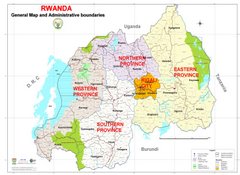Emmanuel Mungwarakarama
Street kids
Date: 20 january 2007
It is the sunset; it looks nice in Butare town. Workers, students and villagers are returning home from their places of work. Sendegeya, 14 struggles to find at least 100 francs. He can’t return home without a half kilo of maize to feed his aunt and his young sister.
The deterioration of values within the families and wider society has played a key part in creating children who are ‘lost’, lack role models and adult guidance. Break ups in the families (through divorce, parental abandonment, remarriage or polygamy and even genocide), as well as widespread sexual and commercial exploitation of children have also contributed to pushing many onto the streets.
Some children spend most of their time working in marketplaces or public spaces, but return home to their families at night.
Sendegeya lives with his aunt and his young sister, since his mother died in the genocide when Sendegeya was just one year old. He never knew his mum, the genocide occurred while he has only one year, after the death of his mum, the aunt decides to take care of him.
Alone, she couldn’t afford to feed the two children. She sent Sendegeya to the market place to look for food to feed his sister and even herself.
“I lost my mum during the genocide, although my aunt used to say she disappeared “ Sendegeya said. “And my dad is now in prison because he killed people.”
Malnutrition, which most children face, poor sanitation and limited resources contributed to worsen the situation.
“In Rwanda, genocide worsened the phenomenon of street children,” says Gilbert Ndahayo, a human rights activist. “The principle of right to life as referred to human rights charity is not compatible with the conditions in which these children live. No one cares about these endangered lives in the streets”
Children on the streets are the result of poverty, negligence or abuse within their family or household, and who lack adequate care and protection from parents, guardians or employers. They often come from broken family backgrounds (both poor and rich), and some have been rendered orphans by the genocide or HIV/AIDS. They are illiterate, and face daily humiliation, verbal abuse or stress that denigrates their sense of self-worth.
Hakizimana decided to go to the street because of lack of care in the family he was living.
“I have only my uncle who doesn’t consider me a human being,” he said.
“He would rather feed his dog instead of taking care of my sister with whom we survived the genocide.”
Many children are necessarily forced to find work in urban areas to supplement inadequate family incomes.
“I must find by all means some money to sustain my family,” says Sendegeya “My aunt will kill me if I return back home empty hands.”
For some of these children, the street is the closest thing to home - the place where they both work and live. They face a daily struggle to survive and secure food, money and a place to sleep. They have lost nearly all contact with their families, and live a high level of independence and determination.
Richard Muhire, 16, lives under the bridge in Kigali town and stays with a group of 6 children. They live a hard life.
“I don’t have anywhere else to stay, and I have lost everything,” he said. “My family died in the genocide, where do I have to go? Instead of being a burden to somebody, I preferred to stay here.
“I don’t pay the rent and I am free.”
Wednesday, February 7, 2007
Subscribe to:
Post Comments (Atom)
Rwanda

Administrative map
Blog Archive
-
►
2010
(59)
- ► 09/19 - 09/26 (1)
- ► 07/11 - 07/18 (5)
- ► 07/04 - 07/11 (5)
- ► 06/27 - 07/04 (4)
- ► 06/20 - 06/27 (6)
- ► 06/06 - 06/13 (17)
- ► 05/30 - 06/06 (4)
- ► 03/28 - 04/04 (2)
- ► 02/28 - 03/07 (3)
- ► 02/21 - 02/28 (5)
- ► 01/24 - 01/31 (2)
- ► 01/17 - 01/24 (4)
- ► 01/10 - 01/17 (1)
-
►
2009
(25)
- ► 11/08 - 11/15 (9)
- ► 10/04 - 10/11 (2)
- ► 01/25 - 02/01 (2)
- ► 01/18 - 01/25 (12)
-
►
2008
(55)
- ► 12/28 - 01/04 (1)
- ► 12/21 - 12/28 (11)
- ► 12/14 - 12/21 (3)
- ► 12/07 - 12/14 (5)
- ► 11/30 - 12/07 (2)
- ► 11/16 - 11/23 (22)
- ► 11/09 - 11/16 (4)
- ► 07/13 - 07/20 (1)
- ► 06/01 - 06/08 (6)
-
▼
2007
(19)
- ► 05/20 - 05/27 (2)
- ► 04/01 - 04/08 (1)
- ► 03/04 - 03/11 (1)
- ► 02/25 - 03/04 (2)
- ► 02/18 - 02/25 (2)
- ► 02/11 - 02/18 (6)
- ▼ 02/04 - 02/11 (3)
- ► 01/28 - 02/04 (2)
-
►
2006
(59)
- ► 10/22 - 10/29 (12)
- ► 10/15 - 10/22 (1)
- ► 10/08 - 10/15 (2)
- ► 09/03 - 09/10 (2)
- ► 08/27 - 09/03 (6)
- ► 07/09 - 07/16 (7)
- ► 06/18 - 06/25 (1)
- ► 04/09 - 04/16 (5)
- ► 04/02 - 04/09 (23)
No comments:
Post a Comment